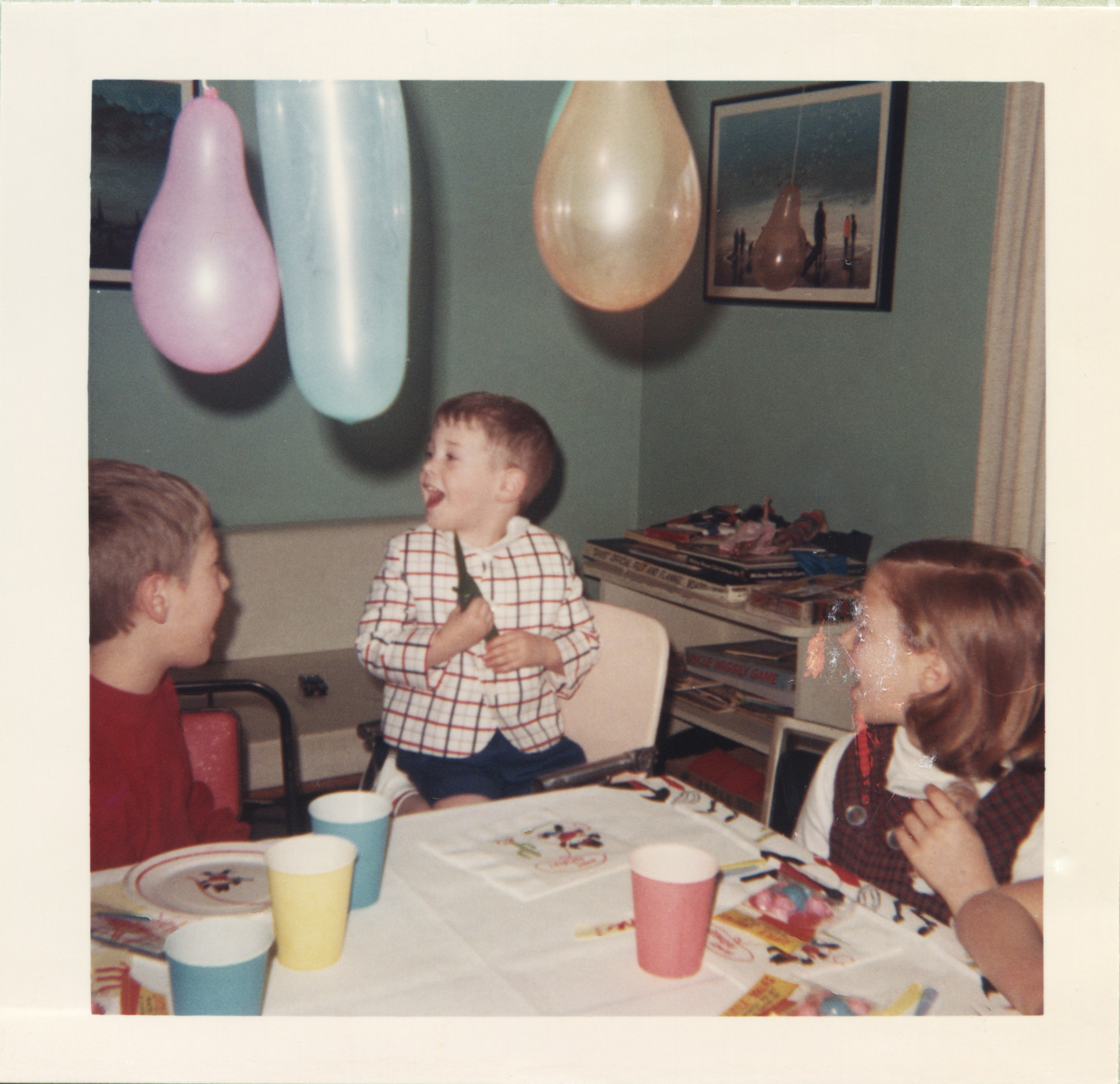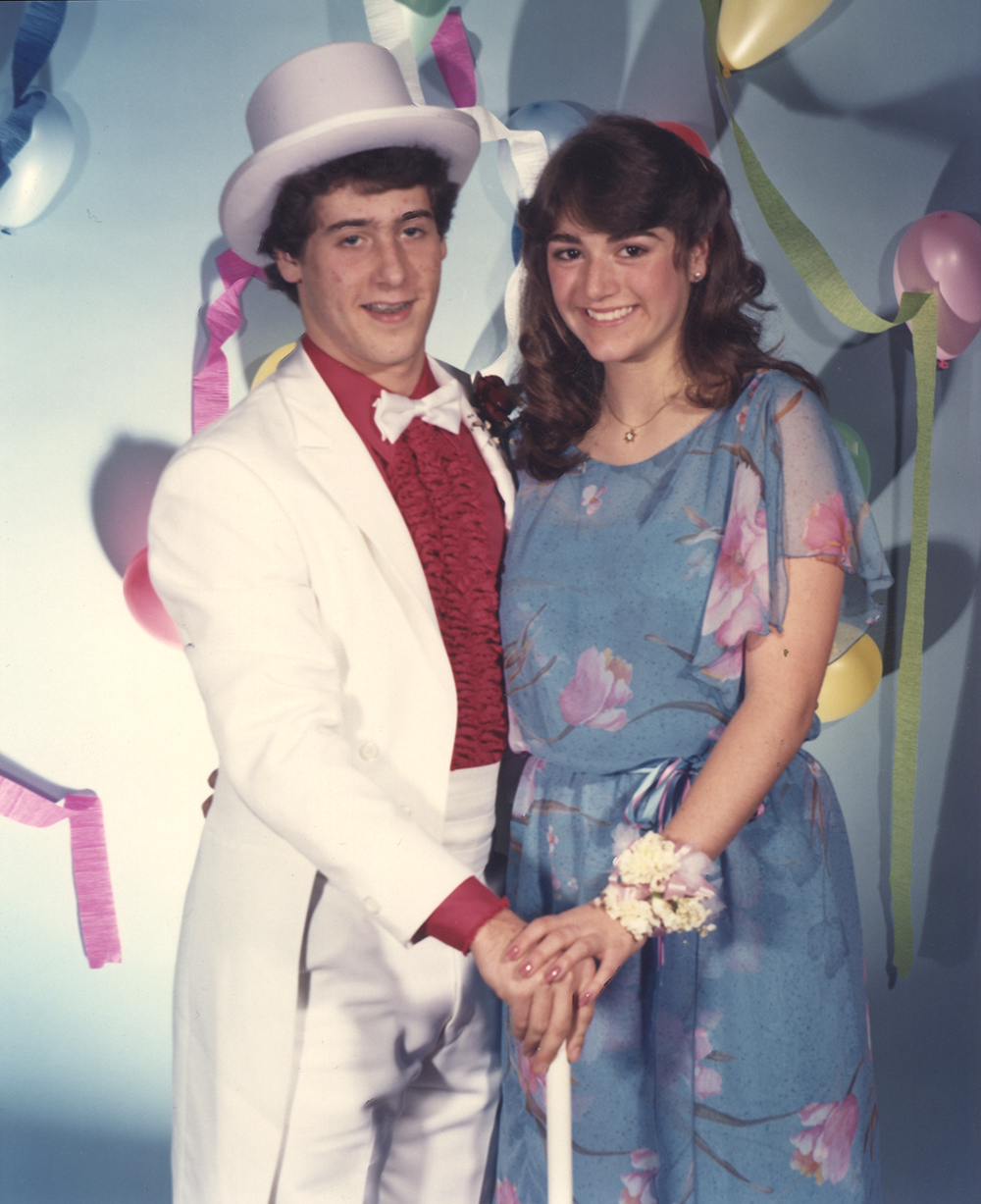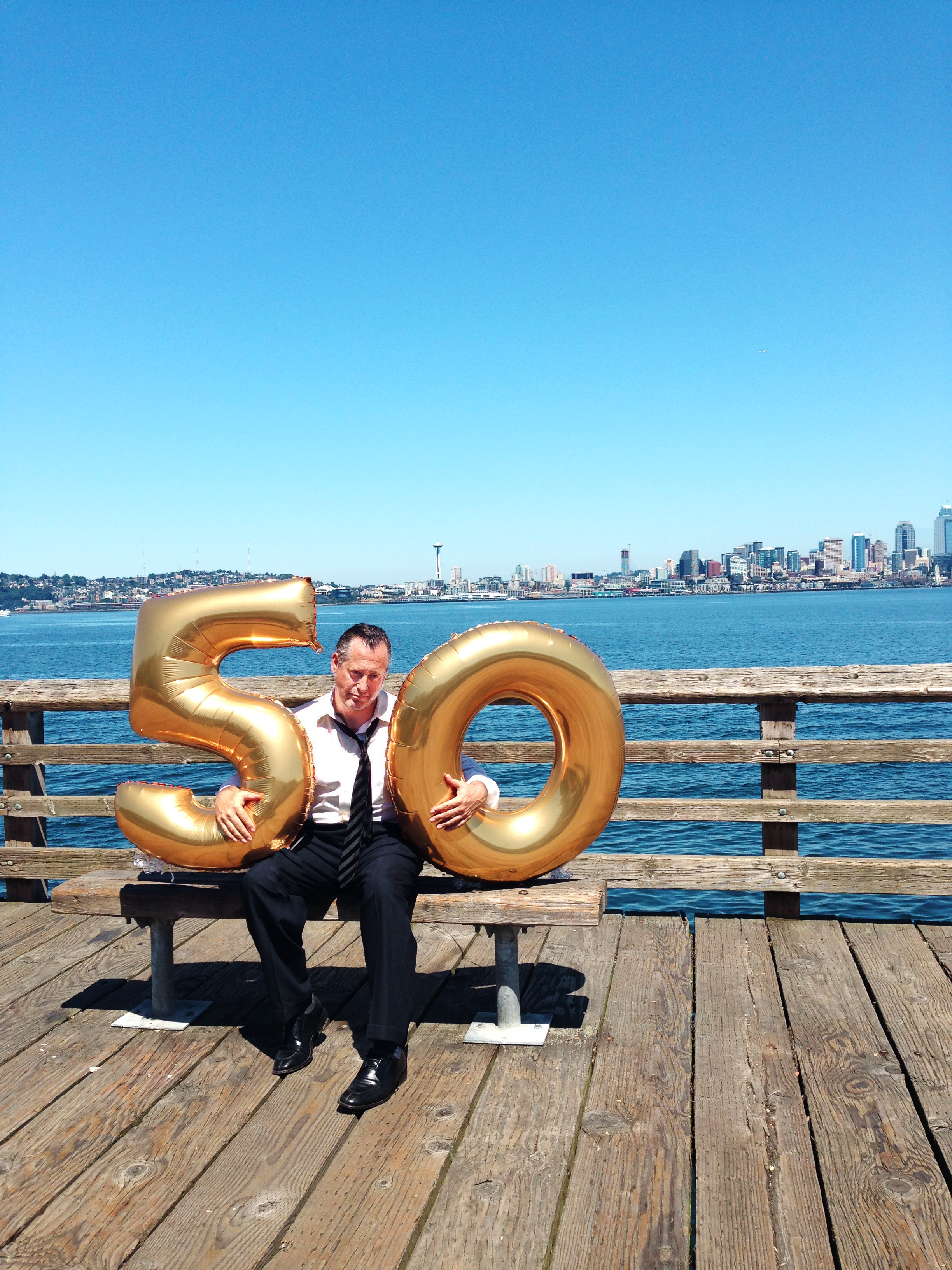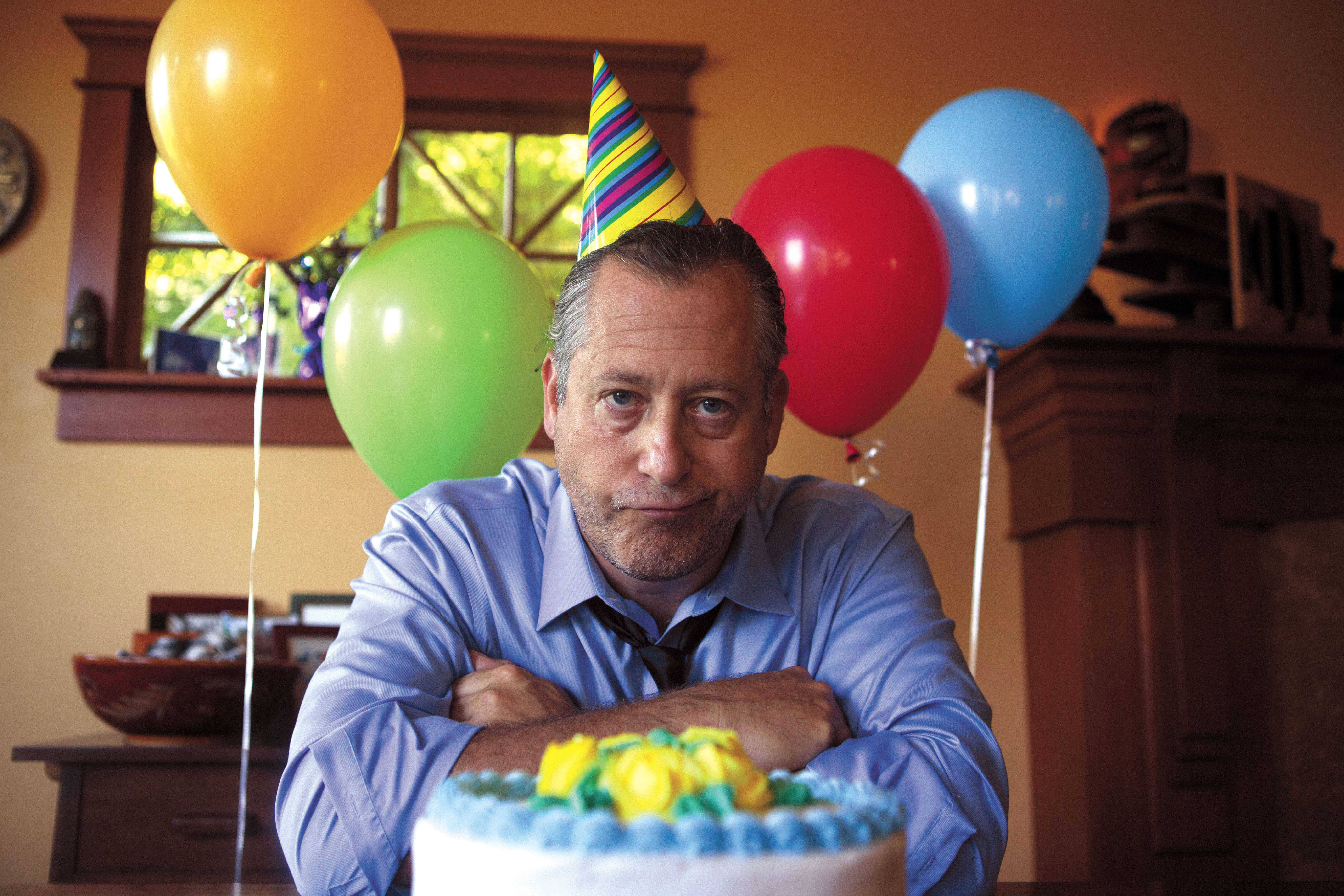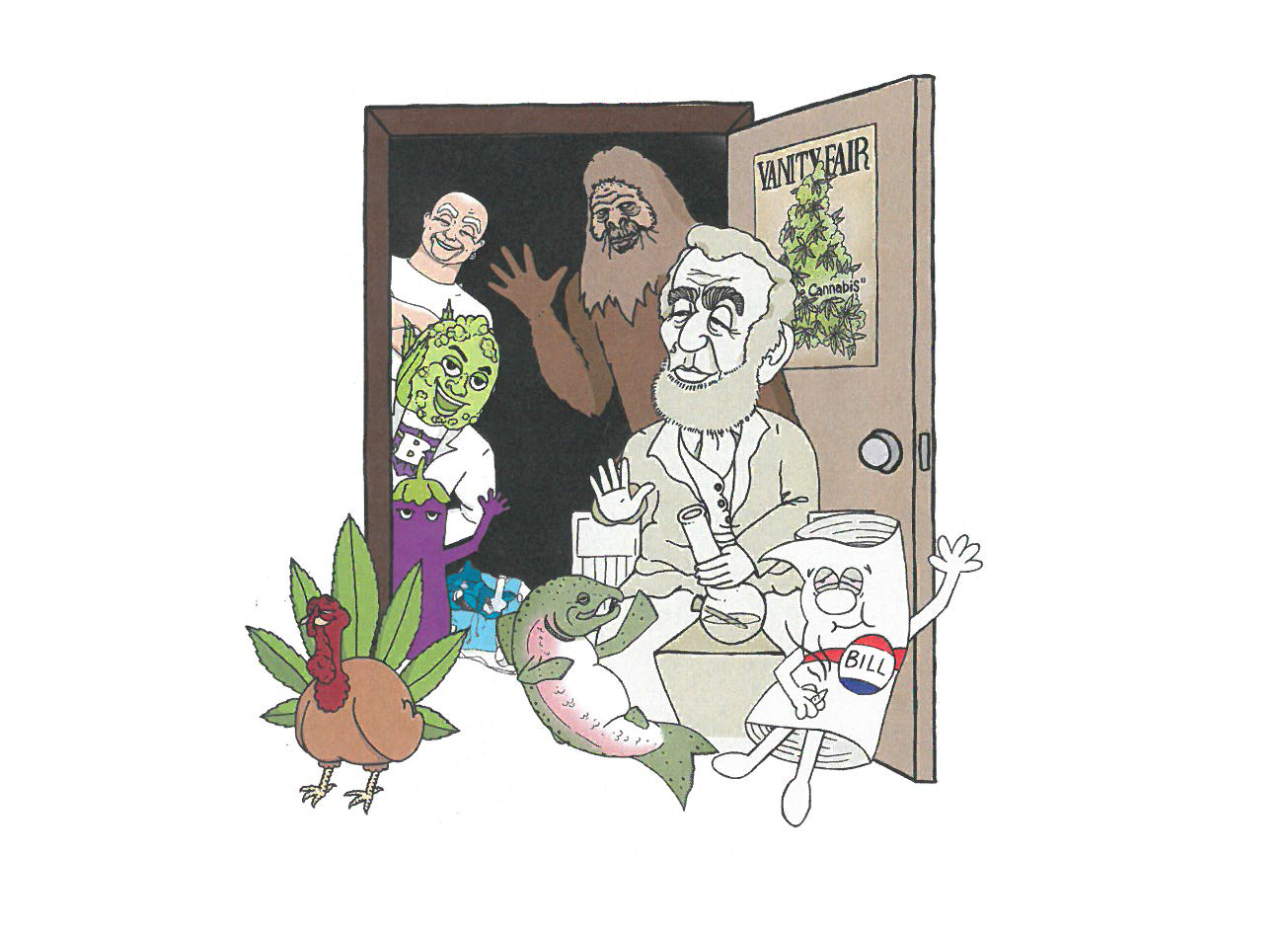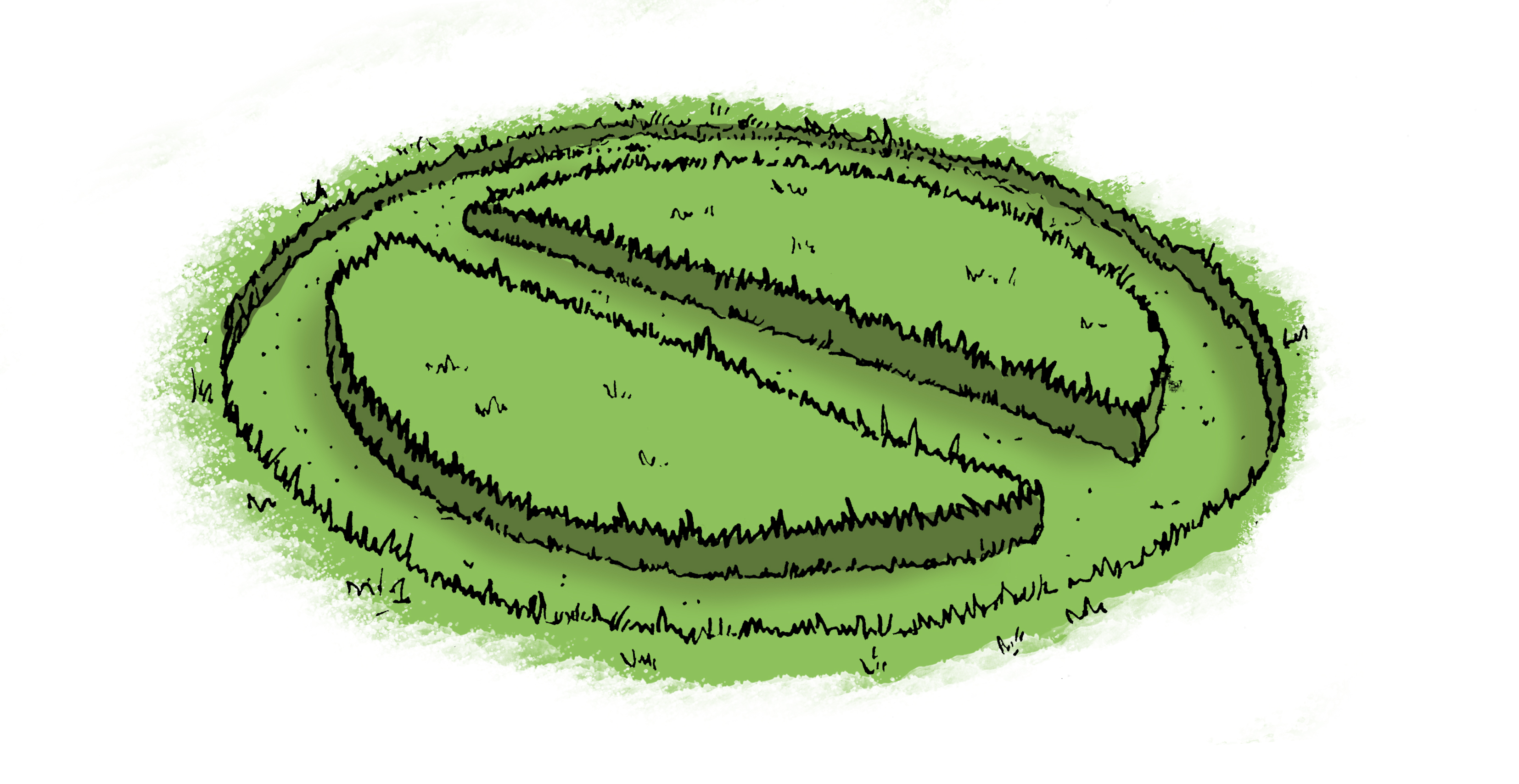“Fifty! That’s fucking old.”
That’s me, screaming, as I kick at a teddy bear on the floor of my therapist’s office.
“It’s halfway to a hundo! Someone says to you, ‘So how old are you?’ and you go, ’50.’ Well, that’s, that’s… That’s fucking old.”
In a few months I’ll hit the half-century mark, and I’m having, well, a few qualms about the notion. Until now, age had never really been an issue, but this particular birthday seems like a dark cloud settling in for the long haul. I can’t quite put my finger on what bothers me about that number. Fifty. According to my mother, everybody’s got a birthday that hits ’em hard. Hers was 40. Perhaps these uneasy feelings are the prelude to a deeper reflection on my life, an opportunity for some recalibration. Then again, maybe it’s just a cue to curl up in the fetal position with a stuffed animal here on my therapist’s floor.
It’s not unusual for Christa Frame to have children’s toys scattered around her office; kids are her main clientele. My ex-wife and I originally hired her in 2008 for my out-of-control teenager step-daughter. When those sessions stalled, we liked Christa’s straightforward approach so much that we used her as a marriage counselor. After we split, I got Christa in the divorce. Given my periodic temper tantrums, it makes perfect sense I’d be seeing a child therapist.
“I’m trying to understand the reason you are having so much trouble about this,” Christa calmly repeats. “It’s just a place in time. You have to look back to see what you’ve done in your life. You are getting to an older stage… ”
“You just called me old,” I interrupt. “Which I am. Fucking old.”
“Modern medicine can get you to 100. We can screen early for cancers, put stints into your heart. Fifty is the new 35!”
A few visits later, Christa runs me through a variety of charts and pyramids and psycho-babble to get to the bottom of my blubbering. Looking over Maslow’s Hierarchy of Needs, I realize I have very little to complain about. My basic needs are met: I have plenty of food, water, shelter, and clothing. I have security against hunger and violence; my need for belonging is also quenched with some great friends and a loving sister. As for my self-esteem, well, it’s off-the-charts. Compared to Syrian refugees, kids scavenging in the dumps of New Delhi, and 95 percent of the rest of the world, at 50 I’ll be the luckiest bastard on the planet. But still.
“It’s obvious you are feeling particularly stressed out about this birthday,” Christa notes during our third session on the subject. “How much different are you from six months ago?” she asks. “Are you old now, and weren’t a year ago? Are you worried you’ll wake up the day after your 50th birthday and not be able to get out of bed? ‘Fucking 50.’ Why is that in your head?”
“Because it’s fucking old! It’s the downhill climb. I only have a limited number of days left!”
“Well, then you best figure out what’s important to you,” Christa replies in a way that makes me want to pick up a nearby Mr. Potato Head and toss it at hers. “Figure out how you’d like to maximize your ‘remaining days’—even though that’s completely ridiculous—and make the best of it.” I got the impression she’d had enough. And my time was up anyway.
An existential crisis of this magnitude was going to take more than talk therapy and a blankey. So I set to gathering a brain trust of sorts to help guide me through this last remaining phase of life. In addition to my therapist, I tapped financial whiz Terry Korotzer, a Tibetan monk named Tulku Yeshi Gyatso, and, most important, the guy who might help keep the ol’ ticker running for a few more precious years, my physician, Terrill Harrington. Team Stusser will be tasked with a few crucial questions: How am I doing? As an old person, how can I maximize the joy factor? Oh, and what’s the meaning of life?
The Good Doctor“People who are already 50 have a much better chance of making it to 100,” Dr. Harrington declares. “If you think about it, the hardest part is the first few years—all the defects and abnormalities you could have been born with, all the infectious diseases and childhood accidents. You’ve already made it past all the crazy shit your friends dared you to do, all the wild things you did as a young man that should have killed you but didn’t. You survived.”
This gives me some relief. Then again, greats like Steve McQueen, Warren Zevon, Clark Gable, Babe Ruth, and Steve Jobs died in their 50s. Elvis was gone at 42, Gilda Radner at 43, and Phil Hartman at 49. Hell, Rod Serling only made it to 50, Napoleon to 51, and Shakespeare to 52.
I try to clear my mind and focus on what my doc is saying.
“It used to be if your doctor told you you had an ulcer, it was pretty much a death sentence,” Dr. Harrington notes while looking over my chart. “People don’t die of pneumonia or strep throat or heart disease anymore. Syphilis killed Al Capone. Now that you’ve avoided the major pitfalls, we can use modern medicine to get you to 100. We can screen early for cancers, put stints into your heart. Fifty is the new 35!”
As for my feeling that 50 was old? “Listen, a child in the hospital with terminal cancer is nearing the end of her life—in that regard, she’s old.”
Great. He’s playing the child cancer card.
“The longer people live—the older middle age becomes,” Harrington railed, placing a wooden plank on my tongue. “We used to have active jobs: hard labor, fishing, working on the line at Boeing. Your main chance of dying was a tree falling on you. Today you’re more likely to die of the complications of your lifestyle.”
He must be referring to the amount of weed I smoke.
“Today we spend all day at our desks. So death comes through inactivity. Heart disease. Cholesterol. Type 2 diabetes.
“You haven’t been arguing about your age—you’re arguing about perspective, you’re arguing about humanity. As you get older—I said older, not old—you see people who get MS or cancer or take pills or pass away. Your friends are old-er. Your parents are aging. And it worries you more. But in your case, you’ve got so much time left—so much ability to do the things you want to do. You may actually have the majority of your life left. Now drop your drawers… ”
The guy with his finger up my ass was right: I could actually be at the halfway point: George Burns made it to 100, as did Irving Berlin, Bob Hope, Queen Elizabeth the Queen Mother, and segregationist bastard Strom Thurmond.
And I do come from good stock. My grandmother Beth made it to 95. She lived large until she started losing her sight and sense of taste around 90, then one day just told everyone to come say goodbye, because she refused to get out of bed again. My mom is 79, Dad is 83, and, thanks largely to all that water aerobics, both could kick my ass. I’ll probably live a long life. Unfortunately, that wasn’t really my concern.
Photo by Anna Erickson
The Ageless Monk“Americans and birthdays, I do not understand,” my Tibetan mentor muses when I visit him a few days later at Sakya Monastery in Greenwood. “Buddhists do not believe it is time for celebration. Birth opens up the beginning of suffering. First birth, then sick, then age, then death… ”
Oh, joy. I thought Buddhists were fat and happy.
“Why celebrate the beginning of suffering? Death we celebrate. In this moment—we are free from suffering. Joyful moment.”
My friend Tulku Yeshi Gyatso always has a way of flipping an idea on its head. We’d been introduced years ago when I wrote an article about my attempt to speak no evil (during my aforementioned divorce). Over tea and miscommunication, we’ve been exploring a friendship ever since. I try to let Tulku know that I would not be celebrating my birthday, but dreading it.
“Maybe this doesn’t apply to you,” I say, trying to explain it to a monk who is somewhere between 30 and 70, with perfect skin, silken robes, and a reincarnated lineage that extends as far as the mind can imagine. “I look in the mirror, I see gray hair and lines, and I just don’t like it. I feel fine, but compared to other people… I’m old!”
“OK, yes. I understand you, Michael,” Tulku says. “My philosophy for you is to not look around so much or you will find what you feel you are missing. All the young, beautiful people, yes? OK, so, for you, maybe only look at people who are older than you—not younger. Don’t go to nightclub if those people make you sad. Find where people are your age… or older! This is a long run. Old people will show you the future—so visit them!”
If I was going to hang out with geriatrics, I’d have to uncover people who lived during the height of the Cold War or came of age during Vietnam—people who were raised on Beatlemania and Ed Sullivan and went to school on the G.I. Bill. Old! And yet I actually belong to the very tail end of this epoch, the baby-boom generation, which covers people born from 1946 to 1964. As the name suggests (boom!), there are a helluvalot of us; baby boomers are, in fact, the largest generation of Americans in U.S. history, numbering 77 million and making up almost 30 percent of the American population.
Though I don’t put much stock in lumping people together, living through Vietnam, MLK’s assassination, and Watergate has created a group of folks with a few things in common. We ask a lot of questions and don’t believe many of the answers. We’re also collectively grappling with issues of retirement, life fulfillment, and joy. And, according to a recent AARP poll, over half of baby boomers have one more thing in common: they plan to work till they drop. I’m no different.
Part of the panic of turning 50 is looking at what my boomer brethren have accomplished at this stage. The President is 52, for fucksake. Thinking about that definitely lights a fire under my ass. My own goal is not to be rich, but famous. Not locally known, not occasionally viral, but historically relevant. And when I look at my current body of work, that means I’ve got a lot to do in whatever time I have left.
The best writer I know, Jess Walter, the author of Beautiful Ruins, put it in perspective one night over cocktails. He noted how schools can only highlight a few authors—Shakespeare’s in, so is F. Scott, Toni Morrison perhaps—and then you start moving on to icons in other fields, such as Einstein, Gandhi, da Vinci, and MLK. I may never reach Hunter S. Thompson’s level of notoriety, Pinter’s brilliance, or Bukowski’s mad skills, but quitting is not an option; the only gig is to keep on writing, day in and day out. Even if it goes on for ANOTHER FUCKING 50 YEARS.
“Ride the wave. As you get older, you won’t be as strong or fast. But for a 70-year-old to lament that he’s not 30 is depressing.”
The Money Man“Listen, if you’re hit by a bus, then you’re finished, right? Your financial problem is over.” My fiscal advisor Terry Korotzer meets the question of my impending elder state on a casual note. “The sooner you die, for finance, the better… ”
The reason money matters is not that it makes you happy (it does), but that it gives you enough leisure time to ponder the possibilities of your remaining years. You know why Gwyneth Paltrow is glowing? Not because she’s beautiful or can do handstands or blow her on-again-off-again Coldplay husband while bouncing her perfect Apple on her Dolce & Gabbana-laden knee, but because she’s got enough money to do some poolside daydreaming, then remove the cucumber wrap and buy those tickets to her third home in the Bahamas . . . where she can do more poolside yoga. If I am going to live another 50 years (or 10, even), I’ll need more money. This is something I haven’t exactly planned for. I’ve got no pension, nothing paid into Social Security, and no real regular or predictable income.
“The old flat-rate-of-return model was fairly straightforward,” explains Korotzer, a financial advisor to some of Seattle’s fattest cats. “You’d look at your Boeing pension, see what kind of Social Security you’d get, look at your investment rate of return. You add up what you have coming in, figure out your expenditures, and see how much you can live on and for how long. That’s no longer how the world works.”
lf you’re looking for a golden ticket, a little insider trading perhaps, or a get-rich-quick trick, Korotzer’s not your guy. Thoughtful and detailed, his method is more Socratic than Madoffic. To come up with a comprehensive plan, he wants to know information I haven’t really considered in my previous 49 years: How long do I intend to keep working? (Do I have a choice?) When do I want to retire? (Do writers get to do that?) How long am I planning to live? (60?) What is my tolerance for risk? (As in, unprotected sex?) How much do I plan on spending in my remaining years? (How much ya got?) What will my earning look like? (What does that even mean?) And do I want to leave anything for anyone else, or was the goal to spend my last dime on my deathbed? (Is it a nice deathbed?)
It was time to tell Korotzer the story of Ted Danson’s house. Ever since I had a chance to attend a fundraiser at the Santa Barbara home owned by Danson and Mary Steenburgen in 1989, I haven’t been able to think of anywhere else. It was fashioned in the Spanish style I love, with an infinity pool that overlooks the ocean and those palm trees. Estimated price: $16 million (in 1989 dollars).
“Well, then, in this case, time is a big help for you. The longer you are alive—the older you get—the more you can work. Some of my clients say, ‘I’m not going to live past 75.’ How they know that is beyond me. Planning for 75 is different than planning for 95. And I can tell you this—no matter how aggressive we make your game plan, if it’s $16 million you say you need… you’re going to need to keep working for a while.”
Americans are working longer hours, for more years, and have little to show for it. Almost 60 percent of adults in the U.S. spend their entire paychecks each month. A recent study by Bankrate revealed that 75 percent of Americans don’t even have enough savings to cover expenses for six months. The average savings for the average 50-year-old? $43,797. As a writer, I don’t really consider what I do “a job,” and thus don’t think about retiring anytime soon. As it turns out, that’s a good thing, because according to the Federal Reserve data, 40 percent of the Americans who are nearing retirement age have zero in savings. Zip. Nada. And for those who do have money in the bank (and IRAs and baskets and GRITs and other types of FDIC-insured piggy banks), the median balance is just $100,000. The worst part? Experts suggest retiring with 10 to 15 times your peak annual earnings, so if you ever earned $75Gs, you’ll need a cool million to kick back Gwyneth-style.
Korotzer tries to explain a new model of financial analysis and planning to me—something called the Monte Carlo simulation. He tells me it is somewhat of a gamble. Then he talks about standard deviations of volatility, expected rates of returns, risk tolerances… My eyes glaze over, and I realize I want to just put the little money I’ve saved under my pillow. Surprisingly, Korotzer doesn’t object.
“Listen, the Monte Carlo simulation isn’t a bad plan, but it’s not for everyone. Perhaps the benefit of putting your nest egg under your pillow is less stress. Though I can think of a few better places that are still safe to put your money than in your mattress, maybe, given your unique circumstances,” he says—referring of course to my lack of children, a mortgage, and a life—“it will work for you.”
Photo courtesy Michael A. Stusser
I grew up one of the most privileged kids on the planet. While I’m not Bill Gates Jr., I am a white, upper-middle-class male, and compared to the rest of the population, spoiled beyond good measure. My father did extremely well in business, and was kind enough to put my sister and I through college, take care of my mentally ill brother, and give us down payments for the houses we live in. Point is, I’m lucky. And I get that. “Inheritance is a factor,” Korotzer points out. “What are your expectations there? Do you know your parents’ plans?” I knew enough to know I wasn’t ever going to starve, but I sure as hell wasn’t going to move into Ted Danson’s house.
My net worth (what’s left after selling everything I own, then paying my bills and settling my debts) is well above average. And the reason that is an important number, obviously, is that it helps people figure out when—and if—they can stop working and start (just) spending. Barring some massive sickness that would wipe out my entire life savings, if I continue to earn $40,000–$50,000 a year for the next decade or so, I should be able to survive comfortably. If all hell breaks loose (cancer, vehicular manslaughter, termites), I’ll sell my house (which luckily, with the help of my father, is paid off), kill my parents (sorry, but you’ve had a damn fine run), and revert to eating ramen. Moving forward, money, it turns out, is not my main concern.
Back to the MonkI return to the monastery to visit Tulku, wanting to pick his brain on the subject of living in the present moment while still doing some longer-term planning. Pulling end-of-life advice out of a man who has been reincarnated several thousand times is like trying to get Miley Cyrus to wear baggy pants. Still…
“Think this way: You are still building this house; not finished. Don’t stop building it—have desire and connection. Hopes for this house,” Tulku encourages while sipping his tea. “It brings energy and joy for the project. When you are done with the house, OK, maybe sad. You will then only have the attachment to this thing, and see its flaws, its wrinkles. Then it will be sad.”
I was fairly sure the “house” he was referring to was a metaphor for my life, but his accent often got in the way of my enlightenment. “Tibetan saying is that old man does not show old age. When your mind is old—only then are you old. Many people have very old body—fall apart—but mind is young. And they are young! Of course, physical body is key. You can hike and work and jump—also helps with mind. So you must take care of this body.”
As for my “old” mindset? “If you were born yesterday, you are older today. Logically, a 20-year-old is much older than 10-year-old. I think now you are in middle,” Tulku says with a sly smile. “Not too young. Not too old. 50 is perfect! Middle is best!”
It’s clear that I’m not stopping to smell the roses. I could be sipping the best organic double-short vanilla macchiato in the entire world, and instead of marveling at the zest of the orange peel or the deep purple tone of the perfect foam or the beautiful woman sitting across from me, I’m wondering if I have enough time on my parking meter before I rush off to the next event, which I won’t be fully present for. This is unacceptable.
It really is just a simple mathematical equation: Figure out what you like to do, then spend a majority of your time doing it. Sacrifices will have to be made. This may mean watching fewer episodes of The Daily Show or skipping my friend’s kid’s 4th birthday party, but something’s got to give. I like putting on a suit and writing in bars, so I’ve added it to my iPhone’s calendar. Repeat three times a week. Oh, and fucking Star Anna. Repeat.
The Younger GirlfriendThough I’ve chosen to spend the bulk of my life as a single man, when it comes to love, I’m an optimist. I enjoy being in relationships, and think people can be more fulfilled when sharing their lives with a significant other. It’s also often an energy-sucking, expensive, stressful pain-in-the-ass. Which brings me to my current love life.
I am in love, with a gorgeous and talented rock star named Star Anna. Star and I have dated for almost nine months, and are a unique and oddly paired couple. The first thing people notice (aside from Star’s hair, which is often pink or platinum or blue) is our age difference; she’s 28, and, as we all know, I’m nearly fucking 50. The reason this matters is not because she and I have wildly different cultural references, interests, or social mores, but because there’s a cliche about older men dating younger women which often gets in the way of what is otherwise a nice coupling. To be honest, I don’t give a rat’s ass what people think, though I do hope she’s not embarrassed when some kid jokingly calls me her Dad on Facebook.
I think where couples with a significant age difference run into trouble is related to maturity. No one wants to date someone prone to hissy fits, hysterics, and immature outbursts. Luckily, Star puts up with mine.
More and more adults are finding themselves single and living alone at my age. According to the Census Bureau, the percentage of one-person households has grown over the past 40 years from 17 percent in 1970 to almost 30 percent today. That’s a combo of people getting married later in life (five years later than in the ’70s); getting divorced at a higher rate; enjoying their newfound freedom; and in my case, all of the above. It also probably has something to do with the ease of accessing online porn.
The U.S. birthrate is also falling, and is currently at its lowest in American history. A recent Pew Research report showed not only that the fertility rate has dropped 9 percent over the past five years, but that childlessness has risen in every racial and ethnic group. (About one in five American women now end their child-bearing years without rugrats, as compared to one in 10 in the 1970s.)
Without kids of my own (my ex-wife has twins from a previous marriage, whom I am close to)—and with a vasectomy to make sure there aren’t any unplanned towheads in the future—it is quite possible I’ll die alone. I don’t mention this for sympathy, but because much of pondering “the end game” has to do with what we want to leave in this world, and to whom. I want to leave a mark—and excess cash to friends, lovers, and Friends of the Earth.
Photo by Anna Erickson
While I respect the hell out of Star as a singer, a poet, and a strong, sexy rock-’n’-roll goddess, I have a great deal of fear around our relationship—make that any relationship. I’m set in my ways. My house is all neat and tidy, and she’s… not. She’s young… and I’m not. I grew up on Mercer Island in a well-to-do Jewish household, and she was raised in a rusted-out school bus on the wide-open plains of Ellensburg (really). Shockingly (to both of us), we just fit: We’ve got similar warped senses of humor; we are both jealous and creative, loyal and strong-willed; and, most important, we love one another and want to make the relationship work.
Unbeknownst to me, being able to tap into heart-wrenching and painfully deep places for creative pursuits can often spill into real life. (Go figure.) While my writing has a range somewhere between Neil Simon and David Sedaris, her songwriting is more on the Nina Simone/Elliott Smith spectrum. “Please don’t lose faith in my love; I can do better next time,” she has written. “My world comes tumbling down, shakes me awake and aware. Skies open up like heaven fell through, endless and stretched to no end.” Star’s desperately dark valleys sometime consume her; maybe—just maybe—this is where my experience can help.
In The Mill on the Floss, the great scribe George Eliot said, “The middle-aged, who have lived through their strongest emotions, but are yet in the time when memory is still half-passionate and not merely contemplative, should surely be a sort of natural priesthood whom life has discipled and consecrated to be the refuge and the rescue of early stumblers and victims of self-despair.”
Since we began dating, Star has quit smoking, started making more eye contact, and cheered up considerably. “We don’t have to figure it all out right now,” I tell her during anxious moments. “We’ve got time.” And I know this… because I’ve lived a long time.
This isn’t to say we don’t have our challenges. A few nights before Thanksgiving last year, Star gave me a preview of the outfit she’d be wearing to dinner with my family—a lovely, conservative ensemble, covering the tattoos that so beautifully adorn parts of her body. Everything seemed perfect, until she showed up on Thanksgiving having dyed her hair green the night before. If opposites attract, we’re fusing into one solid diamond.
A Second Opinion (From the Same Guy)I returned to my doctor’s office and went over my lab results with Dr. Harrington. All was well, given the fact I was fucking old.
“All your indicators are looking good. Cholesterol levels are good. Blood pressure is where it needs to be. If you dropped 10 pounds, you’d feel much better. Get some more exercise, and watch what you eat.”
But what about the cambozola, doc! And the cheesecake!?
“You can have cheesecake now and again, just don’t eat a giant slice. If you’re craving cheese, buy those remnants they have at the Market. But lay off the bread, the pasta. Having a bagel is like eating a donut. Would you eat a donut every morning?” No comment.
“It’s more about your attitude. The more you fight the current, the worse it gets. Ride the wave. As you get older, you won’t be as strong or as fast. But for a 70-year-old to lament that he’s not 30 is depressing. Your question should be, ‘How am I doing for 50?’ Your benchmarks should be security and happiness and love and financial security and passion. Happiness with where you are.”
And what if I get cancer? Or bird flu?
“Fear is a lousy motivator. We’re screening for cancers. You’re going to get a colonoscopy.” I make a face. “A lot of that’s homophobia, by the way. You’re not having sex with a man; he’s putting a camera up your ass.”
I suggested that at my age there were indeed plenty of things to worry about. Like Alzheimer’s. Or terrorism.
“Look, worry can paralyze a person, or worse, have them do the wrong things: taking excessive vitamins or unnecessary supplements. Guys come in here begging for testosterone pills. They’re the equivalent of breast implants for men! You don’t need to worry about giving up gluten or any of that crap. What you should worry about is worrying too much. Depression. Anxiety. Yes, you need to start paying some attention to your body now that you’re 50. Make intelligent decisions.
“Think of all the years you aren’t in control! The first 10 years you’re barely making it, someone is feeding you and telling you what to do and wiping your ass. The next 10 years you can’t drink, everything’s illegal, you don’t have your own house or job. The 10 years after that, you don’t know enough to do anything that well.
And Back to the Therapist“You have a career you enjoy, and are finding success as a writer. You’re in good health. You’re dating a 28-year-old, so obviously there are people who don’t see you as old,” Christa summarizes in our final session. “You yourself said you’re ‘on a roll.’ So what exactly is the problem?”
I sat for a long time staring at the stuffed animals and building blocks in the corner of Christa’s office, and thought about all I’d learned. I realized how fortunate I am to have my life. To have my health. To be in love. To be financially and spiritually at ease. In the end, after all the counsel and guidance, I didn’t want to move to Africa for perspective; I didn’t need to be convinced I might live another 50 years, or that my best days lie ahead. Call it vanity or narcissism or fear, but I just had an issue with the number; it wasn’t that I felt old—just the opposite. I didn’t want to sound old.
“OK,” Christa says, putting her practical thinking cap on. “I get it. There’s been a stigma about asking women their age, and in your own way, you don’t want to deal with that. So don’t.” I wait for the caveat. “Just say something like, ‘I have to tell you, I feel 35.’ Say you aren’t a number—or even that you’re hung up on numbers. Say that you are feeling incredible about your life or career and all the amazing things you’ve done—and that you’d love to talk about that. Say your life is about other things—and that you’re feeling kick-ass.” And when they ask me my biological age? “Tell them you lost count.”
Funny how in the end, it took a child therapist to make me feel young again.
